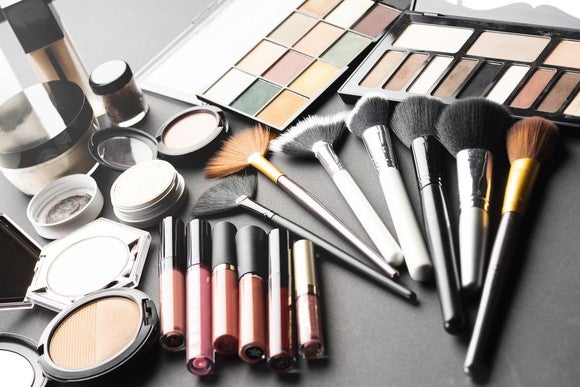Until recently, Ulta Beauty (ULTA +1.18%) was a market darling. The stock had gained a respectable 35% since the start of the year thanks to quarter after quarter of earnings beats. Then on Aug. 29, Ulta reported Q2 2019 earnings per share (EPS) of $2.76, barely missing the average consensus estimate of $2.80. News of that earnings miss kicked off some troubles for the makeup retailer.
The next problem came when Ulta reported that it had slashed forward earnings projections by 7.5%. The quarter itself wasn't that bad. Sales were up 12%, comps up 6.2%, and EPS grew 12.2%. But there are two things investors hate: slowing growth and lowered growth expectations. That's exactly what Ulta reported.
Earlier in the year, Ulta had projected some pretty monster growth numbers for the year, which likely contributed to the stock's steady climb in 2019. As a result of the reduced guidance, Ulta proceeded to erase all its 2019 gains and is now trading negative for the year.

Image source: Getty Images
Headwinds and shifting trends
"We've adjusted our expectations for the second half of 2019 to reflect the headwinds and volatility we're currently seeing in the U.S. cosmetics market," explained Ulta CEO Mary Dillon during the earnings call.
Those headwinds are largely a result of shifting cosmetic trends, most notably the shift away from heavy and time-consuming makeup products to self-care products like skin care. Consumers are switching to products that promote health and beauty naturally without the need to cover up.
That shift is troublesome for Ulta and its competitors because they make most of their money on higher-margin products like makeup. "The cosmetics category at Ulta, which is roughly 50% of our business and one of our highest-margin categories, has only delivered in the low single-digit growth year-to-date, well outperforming the market but [falling] below our expectations," said Dillon.
How is Ulta adjusting?
Ulta recognizes that it needs to do something to respond to the changes in earnings. One effort is forming a new partnership. In August, Ulta partnered with Houston-based luxury brand Sunday Riley, which specializes in skin care for all ages.
"Skin care continues to be one of our strongest growth categories with prestige, mass and sun care, all delivering double-digit comps this quarter," said Dillon. One popular Sunday Riley product, Good Genes Lactic Acid Treatment, comes priced at over $100 an ounce. Another product, C.E.O. vitamin C hydration cream, is $65 for 1.7 ounces. Although these products are expensive, the sales results speak for themselves. Satisfied customers are willing to pay up for products from Sunday Riley because they exemplify the latest trend, promote natural health, reduce the need to buy makeup, and actually work.
Partnerships with companies such as Sunday Riley are steps in the right direction for Ulta. Luxury skincare products have high margins and relatively inelastic demand that round out Ulta's product offering. Although such products are still a tiny portion of Ulta's portfolio, management is focused on reacting to consumer preferences when it comes to natural products with high-quality ingredients.
For the short term, Ulta's partnership with Sunday Riley offers investors a refreshing cleanse in an otherwise difficult time. The recent partnership with Sunday Riley wasn't reflected in the prior quarter's results, but it will be going forward. Investors should keep a lookout for Ulta's skin care division as a likely growing source of revenue and profit margins.
Ulta will need time to respond to shifting cosmetic trends, but so will the competition. For investors looking to enter the sector, Ulta's stock price drop of more than 30% in September could provide a good bargain price for what has been an industry leader and is working to regain its growth trajectory.






